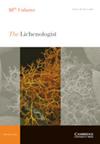针叶树种和年龄是北欧生产林附生地衣群落的驱动因素
IF 1.4
4区 生物学
Q4 MYCOLOGY
引用次数: 3
摘要
摘要对分布在瑞典南部60个苏格兰松和挪威云杉单作林内部的600棵活树的附生地衣物种丰富度和群落组成进行了比较。与挪威云杉相比,苏格兰松树的物种丰富度更高,物种也更独特,这两个树种都有独特的群落。地衣的物种组成也在30岁、55岁和80岁的林分之间发生了变化,尽管不同年龄层之间的物种丰富度没有显著差异。树种和林分年龄解释了群落组成的大部分变化(41%),另外的变化解释为靠近地面的地衣(6%)和侧面的地衣(1%)(树干的北侧/南侧)。苏格兰松和挪威云杉有许多共同的特性,例如都是具有酸性树皮特性的针叶树,在芬诺斯坎迪亚的地理分布相似。然而,我们的研究表明,在这两个树种占主导地位的林分中,物种丰富度和群落组成可能存在差异。由于这些林分中红色名录物种的出现率较低,我们认为,80年的轮作时间不足以满足该地区许多稀有和特殊地衣物种的出现,这些物种需要古老的森林结构和长期的森林连续性。本文章由计算机程序翻译,如有差异,请以英文原文为准。
Conifer tree species and age as drivers of epiphytic lichen communities in northern European production forests
Abstract The epiphytic lichen species richness and community composition was compared for 600 living trees distributed within the interior of 60 Scots pine and Norway spruce monoculture stands in southern Sweden. A higher species richness, and more unique species, was found on trees of Scots pine than of Norway spruce, and distinctive communities were associated with the two tree species. Lichen species composition also shifted between the 30-, 55- and 80-year-old stands, although there was no significant difference in species richness between the different age classes. Tree species and age of the stand explained most of the variation in community composition (41%), with additional variance explained by lichen proximity to the ground (6%) and aspect (1%) (northern/southern side of trunk). Scots pine and Norway spruce share many attributes, such as both being conifers with acidic bark properties and having a similar geographical distribution in Fennoscandia. However, our study showed that species richness and community composition can nevertheless diverge in stands dominated by these two tree species. Since the occurrence of red-listed species was low in these stands, we suggest that 80-year rotations are not long enough for the occurrence of the many rare and specialized lichen species that require old forest structures and long forest continuity in this region.
求助全文
通过发布文献求助,成功后即可免费获取论文全文。
去求助
来源期刊

Lichenologist
生物-真菌学
CiteScore
2.90
自引率
14.30%
发文量
23
审稿时长
6.0 months
期刊介绍:
The Lichenologist is the premier scientific journal devoted exclusively to the study of lichens worldwide. As the leading forum for the dissemination of new concepts and topical reviews, The Lichenologist reaches more scientists concerned with the study of lichens and lichen symbionts than any other single journal. All aspects of lichenology are considered including systematics and phylogenetics; molecular biology; ultrastructure, anatomy and morphology; secondary chemistry, effects of pollutants and use as bioindicators; biogeography. In addition to standard length research papers, the journal also publishes Short Communications and Book Reviews. A monthly issue may occasionally be devoted to papers deriving from a symposium.
 求助内容:
求助内容: 应助结果提醒方式:
应助结果提醒方式:


